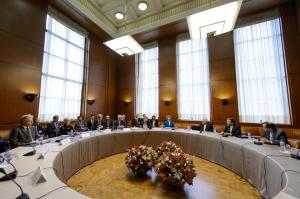 Officials from the P5+1 countries meet with Iranian officials in Geneva on October 15 for talks on Iran's nuclear program.
Officials from the P5+1 countries meet with Iranian officials in Geneva on October 15 for talks on Iran's nuclear program.
By Greg Thielmann
Based on available evidence, the atmosphere and content of the two days of six power talks in Geneva with Iran's new negotiating team bodes well for the chances of achieving an acceptable resolution to the Iran nuclear crisis.
Although full details of the exchanges are not available and the two sides have agreed not to reveal the details, it is clear this round was different than others conducted during the past two years.
In her closing press conference, EU High Representative for Foreign Affairs Catherine Ashton described the talks as "intensive and important," and "the most detailed we've ever had." Iran's Deputy Foreign Minister Seyed Abbas Araghchi took note of the "highly positive atmosphere." In the Joint Statement issued at the conclusion of the round, the negotiations were described as "substantive and forward-looking."
Iranian Foreign Minister Mohammed Javad Zarif opened the first day with a one-hour power point presentation offering a road map for resolving the nuclear controversy. In addition to the plenary sessions, the meetings included several bilateral sessions between Iran's Deputy Foreign Minister, Araghchi, and other P5+1 representatives -- including U.S. Undersecretary Wendy Sherman. The talks were conducted in English.
Notably absent were the long lists of grievances sometimes delivered by Iranian negotiators in the past. Ashton's emphasis on the need for confidentiality in the talks and the apparent success at achieving it suggests the sides were more interested in talking to each other than justifying themselves to the public galleries.
If the two sides maintain serious and sustained negotiations, a framework agreement to resolve the long-running dispute over Iran's nuclear program could be firmed up by the end of this year.
The parties announced they are committed to meeting again in Geneva at senior levels in three weeks (Nov. 7-8) and to holding experts meetings in the interim.
The basic framework of an agreement would likely include Iran's acceptance of significant limits on its enrichment of uranium, including a halt to the enrichment of uranium to 20% and to more than normal fuel grade (3.5%), and increased transparency for monitoring Iran's nuclear program.
For their part, the six powers would recognize Iran's conditional right to continue enriching uranium for peaceful purposes and to remove economic sanctions that have been imposed as a result of Iran's nuclear activities. While Congress will be reluctant to lift these sanctions until the latter phases of any deal, the President of the United States has the necessary waiver authorities on key oil and financial sanctions that can be exercised when and if Iran implements agreed confidence-building steps.
The skeptics of negotiating with Iran will continue to make unrealistic demands and point to the lack of concrete progress out of this one round of talks. But this is clearly the successful start of serious negotiations—and a negotiated deal is clearly the best option on the table to guard against a nuclear-armed Iran.
While there is time for negotiations the time should not be wasted. There is an urgent need to agree on confidence-building-measures, such as limited sanctions relief and halting 20% enrichment. This is necessary both to maintain momentum in the talks and to create political space in capitals while the details of the framework outlined in Geneva are filled in.
In the days and weeks ahead, the leadership of the seven countries meanwhile must remember that success will come from accepting what is most needed, not from demanding what is most desired.
